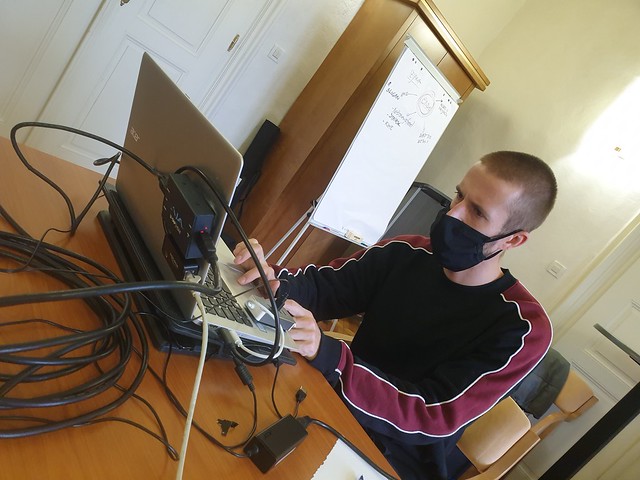
14. 11. 2020 | Bled Strategic Forum, PR
COVID-19 remains top priority for governments worldwide. What does this mean for climate change?
With one year to go before major UN climate change conference COP26 in Glasgow, the British Embassy, Centre for European Perspective and Bled Strategic Forum jointly hosted an online event with leading British and Slovenian experts.
The discussion (titled “COP vs COVID”) considered how the response to COVID-19 might affect climate negotiations, and ambitions, ahead of next year’s conference in the UK.
In a lively discussion, it was clear that action on climate change remains urgent. As climate scientist Professor Sir Brian Hoskins (Imperial College London) emphasized: “Every bit of carbon dioxide that we add today will influence the climate for the next 1000 years.”
COP26 will be the most important international meeting on climate change since Paris in 2015, and our future climate will be largely determined by the global response in the next decade. Professor Dr Lučka Kajfež Bogataj (University of Ljubljana) projected that “our current policies give us a 3% probability of success. What our future will look like depends on the next ten years. Plans for 2050 are useless if we don’t deliver on goals for 2030.”
So the COP26 negotiations under the UK Presidency (in partnership with Italy) needs to be ambitious and inclusive, said Lead COP26 Negotiator for the UK, Archie Young. “Ambition means accelerating real world climate action” – not just setting bolder targets for the distant future.
COVID-19 has undeniably made the response to climate change much more complicated. “We all think that due to COVID-19 we already changed our lifestyles and lowered emissions,” said Prof Kajfež Bogataj. In Slovenia emissions reduced by up to 18% during the first lockdown. “Unfortunately, as soon as the restrictions were loosened in June, emissions went back up.”
However, as Ms Tina Kobilšek from MOP points out: “COVID-19 is not only a challenge, but also an opportunity for change.” While governments are rightly focussed on tackling the virus, climate remains crucial – “We are not only facing a pandemic but also the climate crisis, and that won’t go away.” During Slovenia’s EU Presidency next year, “Slovenia is fully committed to steer the EU towards an ambitious climate target and outcome of COP26.”
Mr Young was clear that the UK sees Slovenia as an important partner. He added: “When COVID meant I had to call countries to postpone COP26, the vast majority agreed that postponing the conference could not mean postponing climate action.” Slovenia’s EU presidency would be vital to sustain momentum in the final months of negotiations.
There was broad agreement that a ‘green recovery’ from COVID-19 was vital. “Stimulus packages can genuinely transform the economy,” said Mr Young, “I understand the temptation to take short term, easy way out option. But now is time to take a step back and think what our economies need to look like in the future, With the right decisions, we can get on the path of achieving the viral Paris climate change goals.”
You can watch the event here.
This was the launch event of the FUTURE PERFECT event series, which will convene experts to ask big questions about our post-COVID future, organized by the British Embassy in Ljubljana in co-operation with CEP, BSF and other partners. The events will offer opportunities for the audience to ask questions directly of leading experts in their fields.


13. 11. 2020 | BIH - Supporting the way to the EU, PR
In the framework of the project “Supporting BiH on its way to the EU”, the Centre for the European Perspective (CEP), in cooperation with the Directorate for European Integration of Bosnia and Herzegovina (DEI), is conducting the fourth workshop in selected chapters of the acquis for civil servants, working at competent authorities. The two-day training, which will be conducted virtually due to the coronavirus pandemic, is taking place between 16 and 17 November 2020 on the topic of conflict of interest.
The aim of the project is to provide training for civil servants, working at competent authorities at all levels of the Government of Bosnia and Herzegovina, and therefore contribute to advanced knowledge of civil servants working in the field of European integration. The inclusion of BiH into the European integration processes is one of the priorities set out in the basic guidelines of BiH’s foreign policy. The trainings provided will be focusing on topics highlighted by the Directorate for European Integration of BiH as priority areas in the period 2019 and 2020. These are topics related to the chapters of the acquis communautaire: 2 – Freedom of movement for workers, 3 – Right of establishment and freedom to provide services, 10 – Information society and media, 19 – Social policy and employment, and 23 – Judiciary and fundamental rights.
Slovenian experts will share experiences and good practices in the field of conflict of interest, especially in its regulation, detection and prevention.
The project is part of the CEP program activities, which are supported by the Ministry of Foreign Affairs of the Republic of Slovenia in the scope of Slovenia’s Development Cooperation.


13. 11. 2020 | Albania - Election, PR
The Centre for European Perspective (CEP) successfully conducted a two-day workshop designed at exchanging experiences between Slovenia and Albania as part of the project “Strengthening the Transparency of Electoral Bodies in Albania.” The virtual workshop took place between 10 and 11 November 2020.
Strengthening democratic institutions is of vital importance for Albania as an EU membership candidate. This process also includes elections and the electoral system, which are ones of the foundations of democratic development and the rule of law. Transparency, including vertical and horizontal communication, is key to the credibility of elections. The deficit in this area requires further efforts to support election administration bodies and all other stakeholders such as citizens, NGOs, the EU and the international community.
The workshop was opened by Mr. Ilirjan Celibashi, the State Election Commissioner, who emphasized that this project has already resulted in tangible recommendations and restated the importance of sharing experiences. He expressed his hope that this webinar will yield event more recommendations that will aid the elections observers in their very important work.
Ambassador Peter Japelj noted that a crucial and historic step was taken by opening the accession negotiations with Albania and North Macedonia and that electoral reform is one of the first crucial steps in strengthening democracy as well as development of society. He emphasized that free and fair elections are a basis for hope for every country. He wished the Albanian people the same experience as he had, one of optimism and confidence when embarking on the road to EU membership.
Renowned Slovenian experts Dr. Alenka Verbole, Dr. Igor Davor Gaon Mr. Dušan Vučko shared in-depth experiences and good practices with colleagues from Albania, focusing on election observation process.
The project is part of the CEP program activities, which are supported by the Ministry of Foreign Affairs of the Republic of Slovenia in the scope of Slovenia’s Development Cooperation.


12. 11. 2020 | Helicopter, PR, Slovenian Development Assistance
Click here to read more about the project in Slovenian language. 
Montenegro, with the help of Slovenia, strengthens the capacity and role of helicopter operations of the Ministry of the Interior in providing public services
On 18 November 2020, a video-conference will be held with the Montenegrin inter-sectoral working group on the development of the role of the Montenegrin Ministry of Interior’s helicopter unit in providing key public services provided by helicopter operations and essential for human safety and health in Montenegro. By exchanging experiences in the field of the helicopter police operation and helicopter emergency medical services, Slovenian experts are contributing to the efforts of Montenegrin colleagues to bring Montenegro up to EU standards in this field.
 The project is part of programme activities of Slovenia’s Development Cooperation Programme financed by the Ministry of Foreign Affairs of the Republic of Slovenia and carried out together with the Ministry of Interior, Ministry of Health and Police of the Republic of Slovenia.
The project is part of programme activities of Slovenia’s Development Cooperation Programme financed by the Ministry of Foreign Affairs of the Republic of Slovenia and carried out together with the Ministry of Interior, Ministry of Health and Police of the Republic of Slovenia.
Further information:
Andreja Dolničar Jeraj
Programme Director
Centre for European Perspective

11. 11. 2020 | BIH - Supporting the way to the EU, PR
Click here to read more about the project in Slovenian language. 
The third training in the framework of the project “Supporting BiH on its way to the EU”, the Centre for the European Perspective (CEP), in cooperation with the Directorate for European Integration of Bosnia and Herzegovina (DEI), successfully concluded on 6 November 2020.
Due to the coronavirus pandemic, the workshop took place virtually between 5 and 6 November 2020 on the topic of cybersecurity. H.E. Ms. Zorica Bukinac, Ambassador of the Republic of Slovenia in Bosnia and Herzegovina and Ms. Maja Rimac Bjelobrk, Assistant Director, Division for Communication and Training in the Field of European Integration, Directorate for European Integration, Bosnia and Herzegovina officially opened the event, emphasizing the importance of capacity building for civil servants working in the field of European integration. The inclusion of BiH into the European integration processes is one of the priorities set out in the basic guidelines of BiH’s foreign policy.
The training provided focused on Chapter 10 – Information society and media of the acquis communautaire. This was one of the topics highlighted by the Directorate for European Integration of BiH as priority areas in the period 2019 and 2020. Slovenian experts from the National Cyber Security Incidence Response Center shared experiences and good practices in the field of cybersecurity. Mr. Gorazd Božič raised the importance of cyber-security incident-response, history of CERT/CSIRT, and international cooperation (TF-CSIRT, Trusted Introducer, FIRST), EU approach (NIS Directive, Cyber-Security Act, role of ENISA, CSIRT Network and NIS Cooperation Group). He presented technical and human-resource requirements in setting up a CSIRT with national/governmental roles, development of technical skills, trainings and resources, exercises and CSIRT maturity levels, as well as incident-handling case-studies and scenarios with examples of “cookbooks” for various categories of incidents and taxonomy. Ms. Jasmina Mešić talked about the importance of effective communication and awareness-raising. She offered the example from Slovenian case study on how to plan and implement public campaigns on cybersecurity-related topics.
The project is part of the CEP program activities, which are supported by the Ministry of Foreign Affairs of the Republic of Slovenia in the scope of Slovenia’s Development Cooperation.










